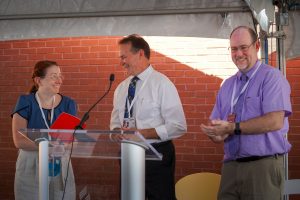33RD Gulf States Constituency Session
What is a Constituency Session?
As part of the organization of the Seventh-day Adventist Church, a Constituency Session is a meeting of elected representatives that conduct church business. As part of the worldwide community of believers, our church is organized on various levels, with each level having a defined membership, also known as a constituency. The constituency-based levels are as follows:
- the local church
- the local conference
- the union conference
- the General Conference
The Constituency Session of the Gulf States Conference brings together delegates (voting members) who represent each of the churches that are part of the Gulf States Conference.
Session Report

The 33rd Gulf States Conference Constituency Session was held on Sunday, September 26, 2021, at the Gulf States Conference Office in Montgomery, Alabama. Members representing churches from around the territory attended this quinquennial session in record fashion, with more attendance than any previous session over the last twenty years. Out of a possible 623 delegates, 419 came to do the business of their collective organization.
Among the business to be accomplished at the session was the election of conference officers, departmental directors, executive committee members, several other sub-committees of the executive committee, and voting on updates to the conference's constitution and by-laws. Conference officers reelected were Brian Danese, president, Martin Fancher, executive secretary, and Gwen Speak, treasurer.
Leading up to the session, administrative and departmental reports were made available online at www.gscsda.org/session. These reports included a video and written version of the report, which allowed constituents and delegates to be fully informed about the mission activity of the conference before the September 26 meeting. The session website also contains helpful information regarding the proposed constitution and by-laws updates. Additionally, numerous virtual town hall sessions were held in August 2021 as an orientation meeting for delegates to the general session. At these town hall meetings, delegates had the opportunity to ask questions of the administrative officers about any of the general session agenda items or other business of the conference. A contact form was also made available on the session website for any constituent to use and ask questions of administrators and directors.
Because of these readily available transparent reports, there was no need for them to be shared at the in-person session on September 26. Martin Fancher, executive secretary for Gulf States, organized the agenda of the general session to be streamlined in several ways, which allowed all of the business to be conducted in less than five hours. Included in this schedule were a 45-minute lunch break, which was an exceptional offering from Todd and Shelley Ward and the staff of Camp Alamisco, and a devotional from Clifford Goldstein, editor of the Sabbath School quarterly.
The delegates approved all updates to the constitution and by-laws, including the proposal to add a virtual option to future hybrid meetings, allowing for those who prefer to join via a virtual, yet secure, method. In-person attendance at future meetings will continue to be encouraged. Additionally, delegates approved a change to the constituency representation from one delegate for 30 members to one delegate for 50 members. This change allows for the number of church representatives to be closer to the spirit of the original constitution, which sought a ratio of three lay people to one employee. At present, while church membership continues to rise, church attendance numbers aren't growing as quickly. This means that a church with 500 members that may only have an attendance of 200 people would have to send 18 delegates—finding 18 willing members among an attendance of 200 that includes members, children, guests, etc., tends to be a challenge. This challenge is evident in that while a record number of delegates attended, there were still over 200 available delegate slots that either weren't filled or the delegate didn't come to the meeting. The danger here is that a quorum of 50% plus one is required to conduct business. While it didn't pose as much of an issue at this particular meeting, it has come close to being problematic at previous meetings. It would have continued to be challenging for future meetings as well because of growing membership.
Departmental directors reelected were Josh Murillo, ministerial director, Scott Bowes, superintendent of education, Gerson Sanchez, Hispanic ministries coordinator, David Sigamani, trust services and publishing director, Michel Rodriguez, youth and young adult director, and Brian Halley, I.T. and auditing director. In addition, the position of communication director was deferred to the executive committee.
The meeting was conducted on the grounds of the conference office, primarily under large tents set up on the North parking lot of the office. At the time of meeting closure, around 3:00 PM Central Time, the weather was at its hottest at 84 degrees. However, the majority of the day was sunny and less than 80 degrees with a light breeze. In general, delegates appreciated the efficiency of the meeting, which allowed most to travel and arrive home at a reasonable hour.